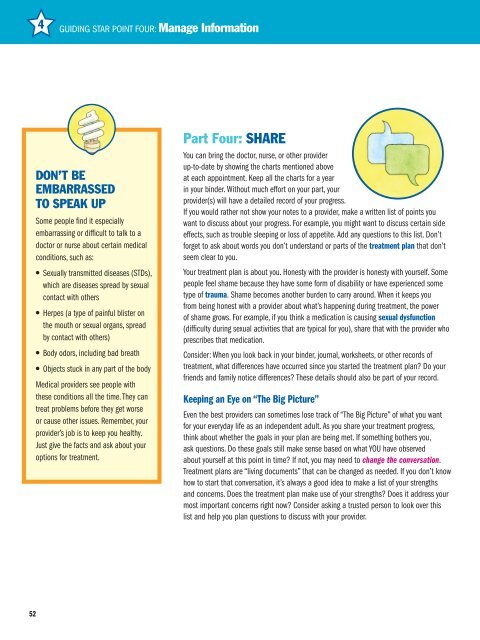Look Inside Young Adult Road Map
Create successful ePaper yourself
Turn your PDF publications into a flip-book with our unique Google optimized e-Paper software.
4<br />
Guiding Star Point four: Manage Information<br />
Don’t Be<br />
Embarrassed<br />
to Speak Up<br />
Some people find it especially<br />
embarrassing or difficult to talk to a<br />
doctor or nurse about certain medical<br />
conditions, such as:<br />
l Sexually transmitted diseases (STDs),<br />
which are diseases spread by sexual<br />
contact with others<br />
l Herpes (a type of painful blister on<br />
the mouth or sexual organs, spread<br />
by contact with others)<br />
l Body odors, including bad breath<br />
l Objects stuck in any part of the body<br />
Medical providers see people with<br />
these conditions all the time. They can<br />
treat problems before they get worse<br />
or cause other issues. Remember, your<br />
provider’s job is to keep you healthy.<br />
Just give the facts and ask about your<br />
options for treatment.<br />
Part Four: Share<br />
You can bring the doctor, nurse, or other provider<br />
up-to-date by showing the charts mentioned above<br />
at each appointment. Keep all the charts for a year<br />
in your binder. Without much effort on your part, your<br />
provider(s) will have a detailed record of your progress.<br />
If you would rather not show your notes to a provider, make a written list of points you<br />
want to discuss about your progress. For example, you might want to discuss certain side<br />
effects, such as trouble sleeping or loss of appetite. Add any questions to this list. Don’t<br />
forget to ask about words you don’t understand or parts of the treatment plan that don’t<br />
seem clear to you.<br />
Your treatment plan is about you. Honesty with the provider is honesty with yourself. Some<br />
people feel shame because they have some form of disability or have experienced some<br />
type of trauma. Shame becomes another burden to carry around. When it keeps you<br />
from being honest with a provider about what’s happening during treatment, the power<br />
of shame grows. For example, if you think a medication is causing sexual dysfunction<br />
(difficulty during sexual activities that are typical for you), share that with the provider who<br />
prescribes that medication.<br />
Consider: When you look back in your binder, journal, worksheets, or other records of<br />
treatment, what differences have occurred since you started the treatment plan? Do your<br />
friends and family notice differences? These details should also be part of your record.<br />
Keeping an Eye on “The Big Picture”<br />
Even the best providers can sometimes lose track of “The Big Picture” of what you want<br />
for your everyday life as an independent adult. As you share your treatment progress,<br />
think about whether the goals in your plan are being met. If something bothers you,<br />
ask questions. Do these goals still make sense based on what YOU have observed<br />
about yourself at this point in time? If not, you may need to change the conversation.<br />
Treatment plans are “living documents” that can be changed as needed. If you don’t know<br />
how to start that conversation, it’s always a good idea to make a list of your strengths<br />
and concerns. Does the treatment plan make use of your strengths? Does it address your<br />
most important concerns right now? Consider asking a trusted person to look over this<br />
list and help you plan questions to discuss with your provider.<br />
52














